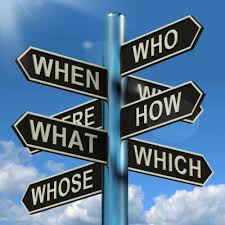 Powerful Coaching questions
Powerful Coaching questions
It seems axiomatic that as Coaches we need to ask powerful questions that really stretch clients and get them to self-reflect and take responsibility for follow through. At a recent Coaching Learning set, Coaches were asking about “really good questions” in their coaching practice as well as the capacity for deep listening and reflection skills. I am a bit ambivalent in a way about the idea of “killer questions” or great questions as so much of coaching work is situational: you need to be able to react in the moment with the client. However, some forward thinking and reflection on how we use questions as a Coach is probably a good thing to do and to think about before a session.
Its also important to reflect on what we do with client’s responses; that is, how we go about really listening to what they have said. I have written an in-depth article on effective listening, that covers things like Scharmer’s 4 types of listening (from downloading through to generative listening) along with the complex skill of reflecting and paraphrasing back to the client at periodic intervals: this offers a synthesis of what they have said to prove understanding and give them the chance to hear back what they have articulated.
My personal favourite questions are ones like scale questions (to test out willingness to change/follow through and often on a scale of 1-10), the “can you tell me more about that?” that opens the clients experience up more, “what was the most helpful thing from today?” and “what would you like me to do differently” questions at the end of a session and “what would a good friend say to you?” about a challenge. The ability to use silence is also important as it gives people the chance to process the discussion, and generate new ideas.
Here are a few different types of questions and approaches:
1. Coaching with metaphor questions
I’m a big fan of using metaphors in coaching, as long as the client is open to this approach and likes using images and metaphors. The article written by Angela Dunbar on coaching with metaphor is a good read. As a tool for coaching, the client’s metaphors give you an insight into their unique perception of their situation and their goals. When the client tells you that they can “see light at the end of the tunnel”, that is what they are experiencing. There is light for them, and they are in a tunnel.
 With practice, the flow of questions can come very naturally. As an example, for the client who sees light at the end of the tunnel, you might ask: “And when you see light at the end of the tunnel, what would you like to have happen?” It might sound obvious to ask this, but we are all unique and some people may be afraid of the light, be happy to stay in the tunnel, or want to turn around and go the other way. Never assume you know what the client may want. The client could answer with: “I want to get out of the tunnel and be in the light” OK, it’s a clear goal. Stay with it and find out more about the outcome. Let the client get a real sense of how it would be to achieve their outcome.
With practice, the flow of questions can come very naturally. As an example, for the client who sees light at the end of the tunnel, you might ask: “And when you see light at the end of the tunnel, what would you like to have happen?” It might sound obvious to ask this, but we are all unique and some people may be afraid of the light, be happy to stay in the tunnel, or want to turn around and go the other way. Never assume you know what the client may want. The client could answer with: “I want to get out of the tunnel and be in the light” OK, it’s a clear goal. Stay with it and find out more about the outcome. Let the client get a real sense of how it would be to achieve their outcome.
“And when you get out of the tunnel, and you can be in the light, is there anything else about that light? “They may tell you it’s warm, or bright or whatever. They are developing their sense of what it would be like. “And when you can be in the light, what kind of ‘you’ is that ‘you’?” The descriptions they give may highlight other metaphors or feelings, which you can continue to explore.
“I feel relieved, like a great weight has been lifted from my shoulders”. “What kind of lifted is that lifted?” or “When you feel relieved, whereabouts do you feel relieved?” (all feelings have a location somewhere, within or for some, even just outside their bodies) or “What kind of weight is that weight?”
Once the outcome has been really explored, generally you will be able to see/sense/notice that the client is ‘connected’ to a change the metaphor question has helped to prompt.
2. A useful sequence of questions in coaching
A sequence of questions are typically situation specific, but there are times where it’s useful to think about related questions that help move the client forward, such as:
- What’s the issue?
-
- What makes it important NOW?
- How important is it on a 1-10 scale?
- How much energy do you have for a solution on a scale of 1-10?
- Who owns the issue?
- What have you tried already?
- In an ideal world what would be happening around this issue? How would you know that it had been resolved?
- What’s standing in the way of that ideal outcome?
- What’s going right here – even if it’s only a bit?
- Imagine you are at your most resourceful, what do you say to yourself about this issue?
- What are the options for action here?
- What criteria will you use to judge the options?
- Which option seems the best one against those criteria?
- So, what’s the next step?
- When will you take it?
- What will get in the way of you taking it?
- So, when will you take it?
3. The good old GROW model!
 I know it seems a bit old hat these days to go back to the simplicity of the “GROW” model, but there are still useful sequential elements to working through the different stages of the model and the type of questions in each of them, such as:
I know it seems a bit old hat these days to go back to the simplicity of the “GROW” model, but there are still useful sequential elements to working through the different stages of the model and the type of questions in each of them, such as:
Goals –
- What do you want to achieve?
- What will that enable you to do, that you can’t do today?
- What are the expectations of others?
- Who else needs to know about the plan? How will you inform them?
Reality –
- What is the reality of the current situation?
- What’s stopped you reaching this goal already?
- What are the real barriers and what are the assumptions?
- Do you know anyone who has achieved this goal?
- What can you learn from them?
Options –
- What are the options for you in this situation?
- What could you do as a first step?
- What else could you do?
- What would happen if you did nothing?
Will –
- Where does this goal fit in with your personal priorities at the moment?
- What obstacles do you expect to meet? How will you overcome them?
- How committed are you to this goal? 1(not at all) – 10 (100% motivated)?
- What steps do you need to take to achieve this?
4. Questions for clients with different challenges
 I think these sorts of questions come into play when working with clients with specific challenges. One of the approaches I often use when working with clients thinking about career change are around reviewing their career to date, and what learning they have gained about positive and challenging experiences:
I think these sorts of questions come into play when working with clients with specific challenges. One of the approaches I often use when working with clients thinking about career change are around reviewing their career to date, and what learning they have gained about positive and challenging experiences:
- Have you focussed work in any particular sectors, or in a particular area of work? If so, does this feel like a positive or a negative?
- How much of the work has been managerial, and/or project focussed without supervision? Have you enjoyed this aspect?
- Are there any themes that emerge for you in “pressing the rewind button” that you can use as threads for looking forward to your next career move (e.g. autonomy, working in a team)?
- What is your overriding feeling about your career to date and the direction it has taken?
Another area which is potentially a bit more contentious in the field of coaching might be where you are working with a client who has self-confidence issues. Some of this could potentially relate to their early year development. As a Coach you might use the “autobiography” approach to understand the historical context of the lack of confidence; where it originated. Relationships with authority figures and peers evolve from our relationships with our parents and parent-figures such as Teachers. This is a key aspect of relationships at work-it will have a fundamental effect on approaches to work and a Coach may need to have some glimmering of understanding about this as the client sees it.
You will not need to ask all these questions, but these are some useful ones.There is always the warning in the autobiography approach that coaching isn’t psychotherapy and shouldn’t dwell too long on the past:
- What was your place in the family; birth order?
- What effect has your birth order had on you: e.g. the experience of being an only child?
- How did you feel about school?
- How do you get on with your siblings?
- What effect has marriage/partners relationships had on your life?
- (For clients with children) what has the experience of being a parent done?
- What did the experiences of higher education do for you?
- How did you make your career choices? What helped you decide to move on from earlier jobs?
- What themes and patterns do you see emerging from the story as you have told it? What are the links to Coaching we will be doing? (not all clients see links; if so that’s fine, just move on)
5. Solutions based coaching questions
Solutions focused questions can be a really effective way of moving a client towards a solution rather than dwelling on the issue or the causes of the problem, and sometimes a client can reach a solution in a very short period of time if you take this approach.
Here are some examples comparing problem focused questions with their solutions focused alternatives:
Problem focused: What is the problem?
Solutions focused: What would you like to achieve from this session?
Problem focused: What is hindering you?
Solutions Focused: What progress have you made so far?
Problem focused: How long have you been experiencing difficulties?
Solutions focused: When in the past have you achieved a positive outcome?
Reflections
There are a multitude of questions that can be used in coaching, and these are just a few examples. Ultimately it feels important to stay curious as a Coach, and know that powerful questions do help clients connect to what they are feeling and move them towards resolution.
I’m not sure there are any magic questions (although this Coaching questions suggests there is!), but it always helps to think about what questions you might ask a client before the session, in the session itself, or reflecting after the session thinking about the next one to come.